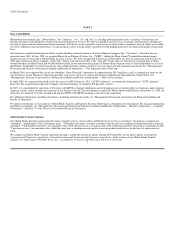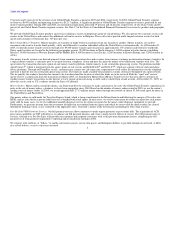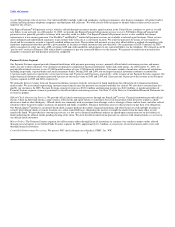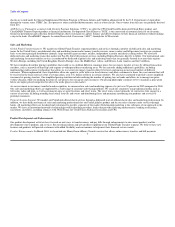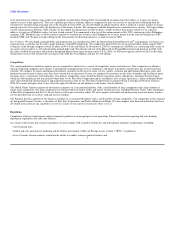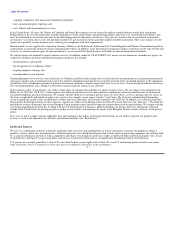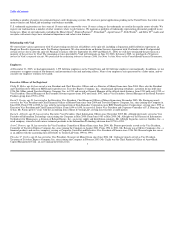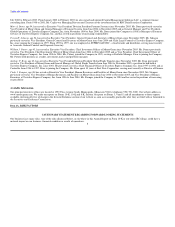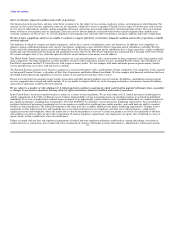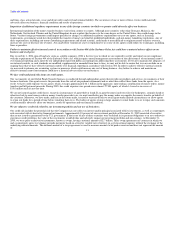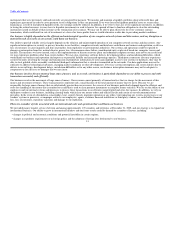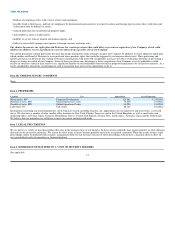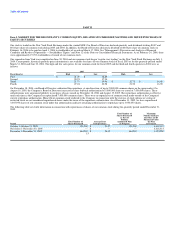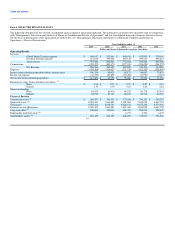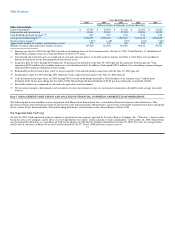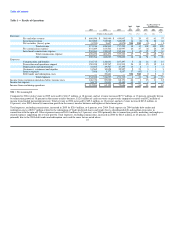MoneyGram 2005 Annual Report Download - page 14
Download and view the complete annual report
Please find page 14 of the 2005 MoneyGram annual report below. You can navigate through the pages in the report by either clicking on the pages listed below, or by using the keyword search tool below to find specific information within the annual report.
Table of Contents
and fines, class action lawsuits, cease and desist orders and civil and criminal liability. The occurrence of one or more of these events could materially
adversely affect our business, financial condition and results of operations.
Imposition of additional regulatory requirements in any of the foreign countries in which we operate could adversely affect our business.
International regulation of the money transfer business varies from country to country. Although most countries (other than Germany, Malaysia, the
Netherlands, Switzerland, Ukraine and the United Kingdom) do not regulate this business to the same degree as the United States, this could change in the
future. Various foreign governments could impose penalties or charges, or additional regulatory requirements on us or our agents, such as licensing
requirements, government watch lists that prohibit the transfer of money on behalf of prohibited individuals, and anti-money laundering regulations. Any of
these requirements, including anti-money laundering requirements and related scrutiny, could make it more difficult to originate money transfers overseas,
increase our costs or decrease our revenues. Any inadvertent violation of a law or regulation by us or one of our agents could subject us to damages, including
fines or penalties.
Failure to maintain effective internal controls in accordance with Section 404 of the Sarbanes-Oxley Act could have a material adverse affect on our
business and stock price.
Due to our July 1, 2004 spin-off and new status as a public company, 2006 is the first year in which we are required to certify and report on our compliance
with the requirements of Section 404 of the Sarbanes-Oxley Act, which requires annual management assessments of the effectiveness of our internal control
over financial reporting and a report by our independent registered public accounting firm addressing these assessments. If we fail to maintain the adequacy of
our internal controls, as such standards are modified, supplemented or amended from time to time, we may not be able to ensure that we can conclude on an
ongoing basis that we have effective internal controls over financial reporting in accordance with Section 404. In order to achieve effective internal controls
we may need to enhance our accounting systems or processes which could increase our cost of doing business. Any failure to achieve and maintain an
effective internal control environment could have a material adverse effect on our business.
We face credit and fraud risks from our retail agents.
The vast majority of our Global Funds Transfer business is conducted through independent agents that provide our products and services to consumers at their
business locations. Our agents receive the proceeds from the sale of our payment instruments and we must then collect these funds from the agents. As a
result, we have credit exposure to our agents, which averages approximately $1.1 billion in the aggregate, representing a combination of money orders, money
transfers and bill payment proceeds. During 2005, this credit exposure was spread across almost 27,500 agents, of which 14 owed us in excess of
$15.0 million each at any one time.
We are not insured against credit losses, except in circumstances of agent theft or fraud. If an agent becomes insolvent, files for bankruptcy, commits fraud or
otherwise fails to remit money order or money transfer proceeds to us, we must nonetheless pay the money order or complete the money transfer on behalf of
the consumer. Moreover, we have made, and may in the future make, secured or unsecured loans to retail agents under limited circumstances or allow agents
to retain our funds for a period of time before remitting them to us. The failure of agents owing us large amounts to remit funds to us or to repay such amounts
could materially adversely affect our business, results of operations and our financial condition.
We are subject to credit risk related to our investment portfolio and our use of derivatives.
Our credit risk includes the potential risk that the Company may not collect on interest and/or principal associated with its investments, as well as counterparty
risk associated with its derivative financial instruments. Approximately 83 percent of our investment portfolio at December 31, 2005 consisted of securities
that are not issued or guaranteed by the U.S. government. If the issuer of any of these securities were to default in its payment obligations to us or to otherwise
experience credit problems, the value of the investments would decline and adversely impact our investment portfolio and our earnings. At December 31,
2005, we were party to derivative instruments, known as swaps, having a notional amount of $2.7 billion. These swap agreements are contracts in which we
and a counterparty agree to exchange periodic payments based on a fixed or variable rate of interest on a given notional amount, without the exchange of the
underlying notional amounts. The notional amount of a swap agreement is used to measure amounts to be paid or received and does not represent the amount
of 11


